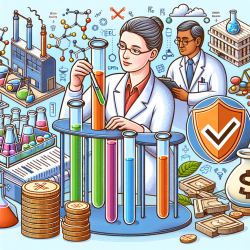Introduction to Bioethical Challenges in Medicinal Chemistry
In the realm of medicinal chemistry and drug treatment, ethical considerations are paramount. The research paper "Bioethical Issues in Medicinal Chemistry and Drug Treatment" by Wolpe et al. (2007) provides a comprehensive overview of the ethical challenges faced by practitioners and the pharmaceutical industry. This blog aims to distill key insights from the paper to help practitioners improve their skills and encourage further research in this critical area.
Understanding the Ethical Landscape
Bioethics, as a discipline, encompasses the ethical principles surrounding medical practices, including drug treatment. It addresses the impact of biotechnological advances on human health and the ethical guidelines that should govern these practices. Practitioners must navigate a complex landscape where ethical principles such as patient autonomy, informed consent, and justice in access to treatment are paramount.
Key Ethical Challenges in Drug Treatment
- Safety: Ensuring drug safety is a fundamental ethical mandate. Practitioners must balance the therapeutic benefits of drugs against their potential side effects and toxicity. Ethical concerns arise when safety standards are compromised for profit or market share.
- Economic Inequality: The high cost of drugs and the concentration of pharmaceutical power in wealthier nations pose significant ethical challenges. Practitioners should advocate for equitable drug distribution and support initiatives that address the needs of underserved populations.
- Research and Development Priorities: The focus on profitable lifestyle drugs over essential medications for communicable diseases highlights the ethical dilemma of prioritizing profit over public health. Practitioners can play a role in advocating for research that addresses global health challenges.
Practical Steps for Practitioners
Practitioners can take several steps to enhance their ethical decision-making in drug treatment:
- Stay Informed: Keep abreast of the latest research and ethical guidelines in medicinal chemistry. Engage with interdisciplinary teams to gain diverse perspectives on ethical issues.
- Advocate for Patients: Ensure that patients have access to necessary medications and that their autonomy and informed consent are respected. Work to address disparities in drug access and affordability.
- Promote Ethical Research: Support research initiatives that prioritize global health needs and address the ethical implications of drug development and distribution.
Conclusion
Ethical considerations in medicinal chemistry are complex and multifaceted. By understanding the key challenges and taking proactive steps, practitioners can contribute to more ethical drug treatment practices. For those interested in delving deeper into the ethical issues discussed, I encourage you to read the original research paper, Bioethical Issues in Medicinal Chemistry and Drug Treatment.










